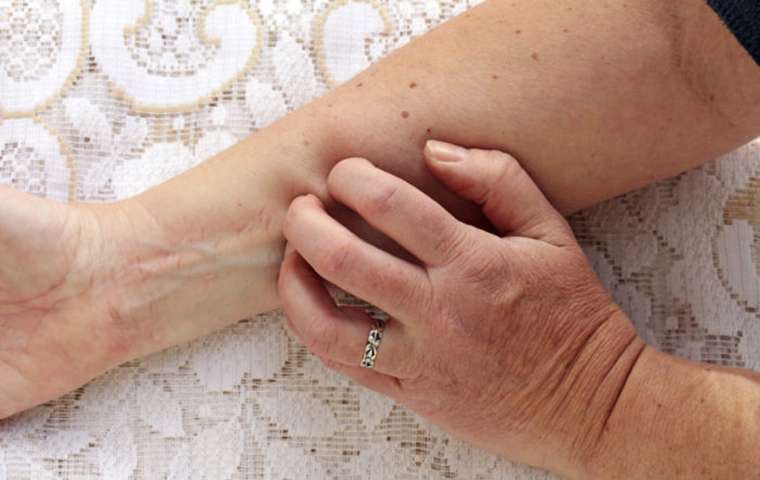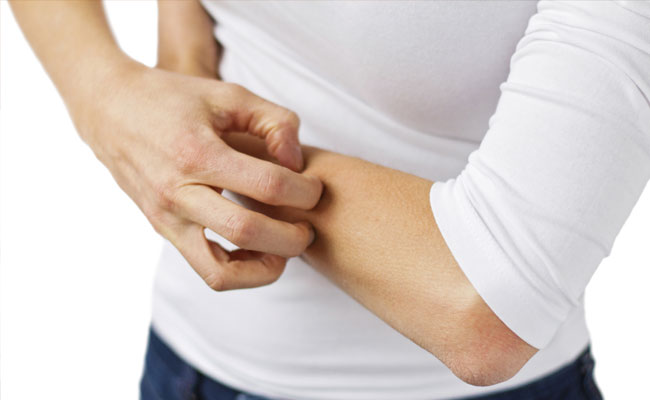Are you suffering from excessive itching? You may be experiencing itchy skin, also called pruritus. Often, it can get so bad that you have a constant urge to scratch. Several underlying conditions can cause overwhelming itching. They range from skin rashes, dermatitis, allergic reactions and even internal diseases. If you cannot relieve your itchiness, it is important to contact your doctor to diagnose the cause and recommend treatment.

What Is Behind Your Uncontrollable Itching?
The itchy feeling you experience can be located in one particular spot or all over your body. There are so many possible causes. Though rare, diabetes or kidney disease can cause itchiness, but so can dry skin. Keep reading to learn more about the causes.
1. Stress
Stress is known to trigger several reactions, including skin itching. It makes your skin more reactive and prone to inflammatory issues. Stress can make you more susceptible to acne, eczema, hives and psoriasis. When you start to get overly concerned about your skin’s appearance due to one of these conditions, you can create a relationship between stress and itchiness. Also, studies have shown that stress releases hormones that affect nerve endings and cause skin inflammation.
2. Skin Conditions and Illnesses
There are several skin conditions and illnesses that cause annoying itching.
Skin Conditions
- Eczema: a disorder that causes itchy skin and scaly rashes.
- Psoriasis: an autoimmunity disease, which appears as plaques that cause irritation and redness of the skin.
- Dermatitis: general skin inflammation.
- Dermatographism: an itchy, red and raised rash brought on by pressure on your skin.
Illnesses and Disorders
- Lice
- Measles
- Chicken pox
- Pinworms
- Mites
- Bedbugs
- Scabies
- Fungal rashes
3. Irritants
Irritants can cause itchy skin because they are substances that cause an adverse reaction through contact. Sometimes it can be a reaction to dyes or perfumes. Other times, it can be a chemical reaction from poisonous plants like poison oak or ivy. Food allergies can also lead to skin irritants, as well as mosquito bites.
4. Internal Diseases
When your skin looks normal, yet it is very itchy, you may be suffering from an internal disease. Possible causes include:
- Leukemia
- Liver disease
- Kidney failure
- Anemia
- Lymphoma
- Thyroid disease
5. Disorders of the Nervous System
There are several disorders that affect the nervous system. Several of these conditions can cause uncontrollable itching, including:
- Shingles
- Diabetes
- Multiple sclerosis
- Neuropathy
6. Medications
If you are suffering from itchy skin, it may be caused from a medication you are taking or recently discontinued. Common medications causing skin irritation include:
- Antibiotics, particularly sulfa-based
- Narcotic painkillers
- Antifungals
- Anti-convulsants
7. Pregnancy
If you are pregnant, you may experience intense itching on your arms, thighs, breasts or stomach. This can be caused by the stretching of your skin or dry skin conditions. If you suffer from a preexisting skin disorder like psoriasis or eczema, it may get worse.
8. Sunburn
If you stay in the sun too long, you increase your risk of sunburn. There are several symptoms of sunburn, including itching. Other signs include:
- Red, painful skin
- Skin peeling
- Blisters and swelling
- Warm to the touch skin
- Fever
- Headaches
The best way to prevent your skin from burning is to use a sunscreen whenever you go outside. Use a SPF of 30 or above, even in cloudy conditions. Keep in mind that you are most likely to suffer from sunburn between 10 am to 4 pm.
9. Dry skin
Often, itchy skin can be caused by something as simple as dry skin. When you are not suffering from a rash or other changes to your skin, this is probably the culprit. Common reasons for dry skin, also called xerosis, are bathing or showering too much, aging skin, and constant use of central heating or air conditioning.
When to Seek Medical Help

You should contact your doctor for an evaluation if you experience the following:
- Itchy skin is severe.
- You have other symptoms, even if they appear unrelated.
Seeing your doctor is important if you can’t pinpoint the cause of your uncontrollable itching because it may be due to an underlying condition that can be remedied by the proper treatment.
Once you make your appointment, you will undergo a physical exam and your doctor will question you about your condition. Questions include:
- Does your itching go away and then come back?
- Do you suffer from allergies?
- How long have you been suffering from itchy skin?
- Have you been exposed to any substances that can cause skin irritation?
- What medications are you currently or recently taking?
- Where does it itch the most?
Your doctor may order other diagnostic tests if needed. Possible tests include:
- Skin test: diagnose allergies
- Blood test: uncover underlying illnesses
- Biopsy: for skin infections
- Thyroid function: determine thyroid issues
Once a determination can be made, your doctor will know the best course of treatment. If it is an underlying condition, your itchiness may not go away until the illness is resolved. If it is less serious, it may only take a prescription topical cream or lotion to take care of the issue.
Home or Self-Care Remedies
- If able, identify the cause of your itching and stay away from it. This can range from over bathing, too hot of water for showering, perfumes, too high heat or air-conditioning, detergents or soaps, cleaning products, rough fabric like wool or other skin irritants.
- Apply highly-effective skin moisturizers and creams. Use on your skin to relieve itching. Quality brands include Eucerin and Cetaphil.
- Other gels or creams available to help with your irritated skin are ones containing 1 percent menthol or calamine lotions.
- Anti-itch lotions or creams can help relieve uncontrollable itching. Over-the-counter hydrocortisone cream, lotions that include capsaicin or topical anesthetics can give relief.
- Do not scratch. It will only make it worse. If it is really bad, wear gloves when sleeping. Keep your nails short and cover the irritated area.
- Wet and cold compresses can relieve itching and stop the urge to scratch. You can cover your irritated skin with a wet dressing if it helps.
- Take a warm shower or bath, not hot. You can try a cold shower if you don’t mind the temperature. Sometimes adding oatmeal or baking soda to a warm bath and soaking for up to 20 minutes can relieve itchy skin. Some people recommend hot showers for certain conditions, but results vary. After bathing, apply a moisturizing cream or lotion.
- Keep stress levels down. If you need, seek therapy or counseling to reduce your stress. You can also try yoga or meditation.
- Take an over-the-counter medication for allergies. Keep in mind, several can make you drowsy, like Benadryl, but they can help prevent scratching at night.
